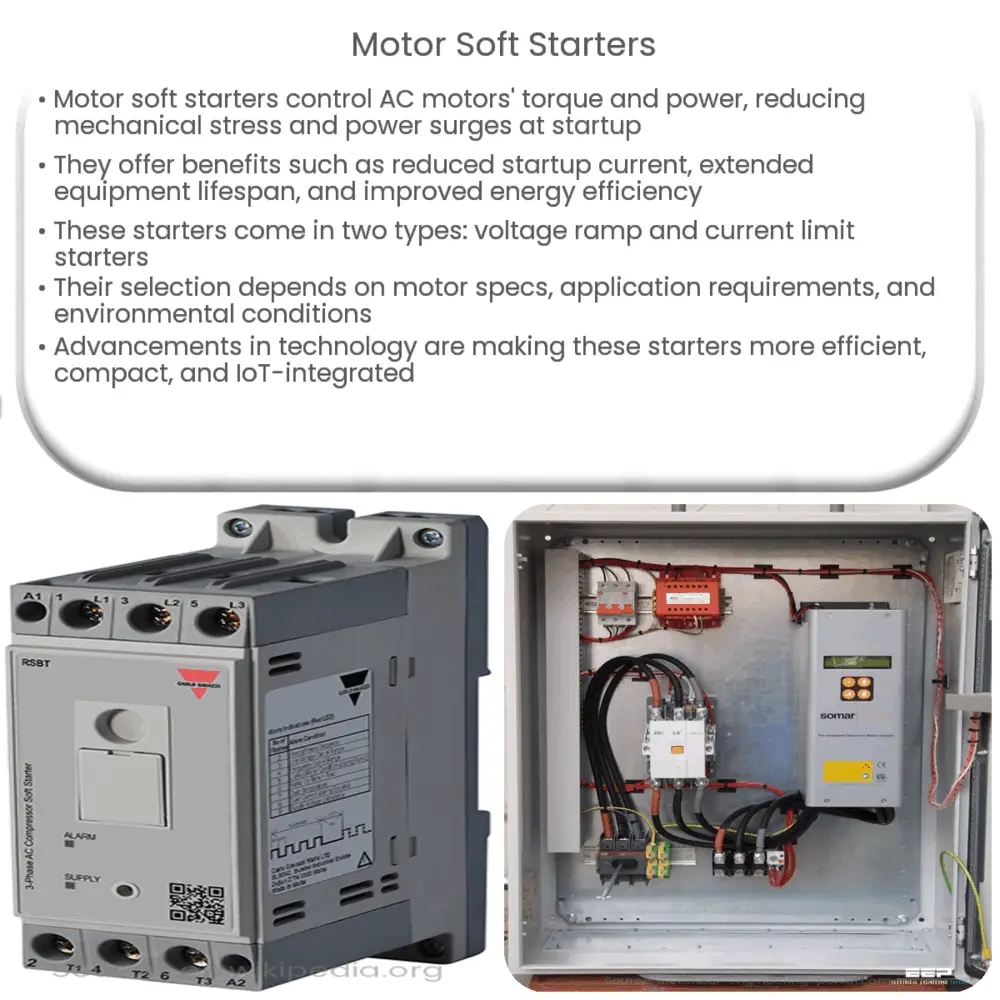Explore the operation, benefits, and applications of motor soft starters, with insights on selection criteria and their future in motor control.

Understanding Motor Soft Starters
A motor soft starter is an essential device in controlling the torque and power of AC motors, providing a smooth ramp-up to full speed. This article aims to shed light on motor soft starters, their operation, and their significance in industrial applications.
What are Motor Soft Starters?
A motor soft starter is a device that manages the starting torque and surge current of an electric motor, reducing the mechanical stress on the motor and its load. Often, motor soft starters are utilized to prevent potential damage caused by sudden inrushes of power.
The Principle of Operation
The core operation of motor soft starters revolves around the control of the voltage supplied to the motor. A soft starter gradually increases this voltage, allowing the motor to accelerate smoothly until it reaches its operating speed. This process, known as ‘ramp up,’ significantly reduces the power surge and mechanical shock that a motor might otherwise endure at startup.
Benefits of Motor Soft Starters
- Reduced startup current and voltage drop: By controlling the initial voltage, motor soft starters mitigate the risks associated with high startup current, such as voltage drops in the power supply network.
- Extended equipment lifespan: The gentle ramp up provided by the soft starter lowers mechanical stress, thereby improving the longevity of both the motor and the connected load.
- Improved energy efficiency: By smoothing out the motor’s startup process, soft starters can reduce power demand and improve energy efficiency.
Types of Motor Soft Starters
Motor soft starters come in two primary forms:
- Voltage Ramp Starters: These starters control the initial voltage, gradually increasing it until the motor reaches full speed.
- Current Limit Starters: These limit the starting current, allowing the motor to accelerate smoothly. They’re typically used in applications where voltage drops are a significant concern.
Applications of Motor Soft Starters
Motor soft starters have wide-ranging applications in various industries. They are commonly found in conveyor systems, pumps, fans, and compressors. In addition, they play a significant role in sectors where precise motor control is paramount, such as water treatment plants, oil and gas industries, and manufacturing plants.
Selection Criteria for Motor Soft Starters
Choosing the right motor soft starter depends on a variety of factors:
- Motor Specifications: The voltage, power, and load characteristics of the motor are crucial in determining the right soft starter.
- Application Requirements: The specific requirements of the application, including starting and stopping scenarios and operating cycles, should be considered.
- Environmental Conditions: Factors such as ambient temperature and available cooling can affect the performance and lifespan of a soft starter.
Future of Motor Soft Starters
Advancements in technology continue to shape the future of motor soft starters. They are becoming increasingly efficient, compact, and sophisticated, integrating features such as programmable settings and self-diagnostic capabilities. As the Internet of Things (IoT) expands, the remote operation and monitoring of motor soft starters are becoming more prevalent, improving the ease of maintenance and troubleshooting.
Conclusion
In conclusion, motor soft starters play a critical role in the control of electric motors, providing a multitude of benefits ranging from reduced startup current to increased equipment lifespan. They are integral components in a wide range of industries and applications. As technology continues to advance, the sophistication and capabilities of these devices are expected to rise, marking a promising future for motor soft starters in the realm of motor control solutions.

